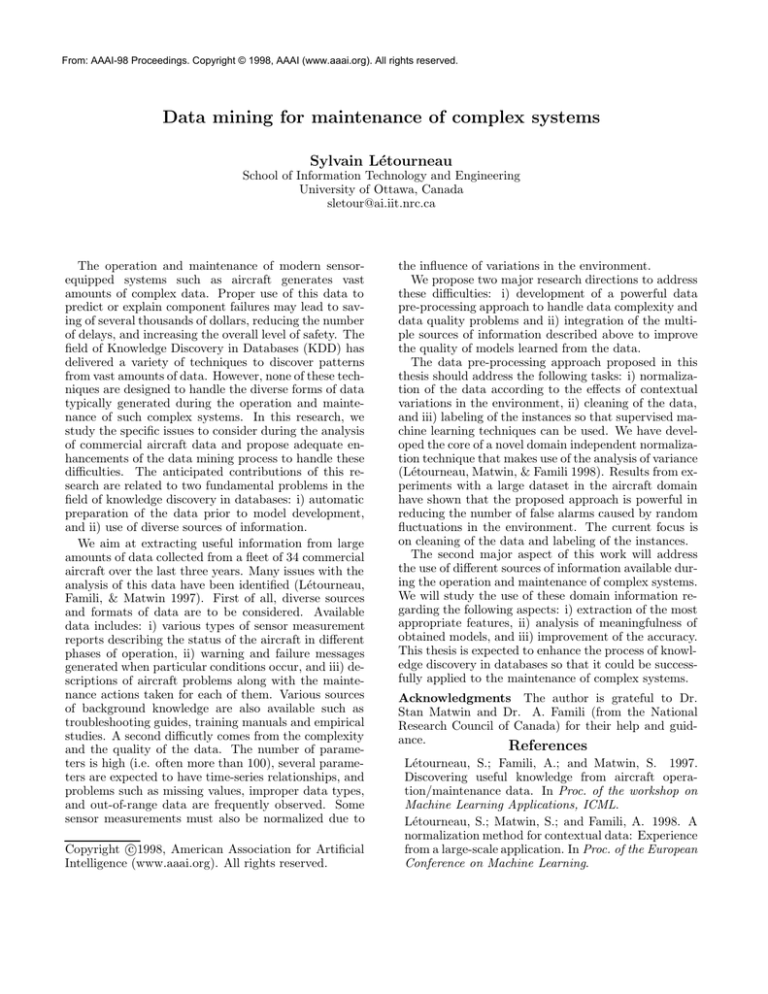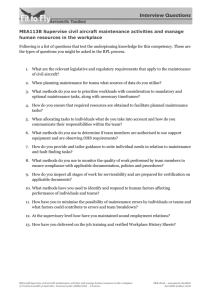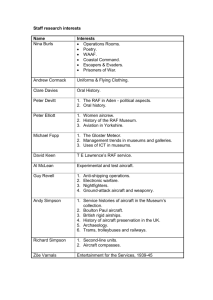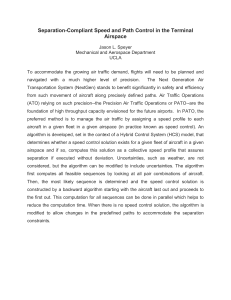
From: AAAI-98 Proceedings. Copyright © 1998, AAAI (www.aaai.org). All rights reserved.
Data mining for maintenance of complex systems
Sylvain Létourneau
School of Information Technology and Engineering
University of Ottawa, Canada
sletour@ai.iit.nrc.ca
The operation and maintenance of modern sensorequipped systems such as aircraft generates vast
amounts of complex data. Proper use of this data to
predict or explain component failures may lead to saving of several thousands of dollars, reducing the number
of delays, and increasing the overall level of safety. The
field of Knowledge Discovery in Databases (KDD) has
delivered a variety of techniques to discover patterns
from vast amounts of data. However, none of these techniques are designed to handle the diverse forms of data
typically generated during the operation and maintenance of such complex systems. In this research, we
study the specific issues to consider during the analysis
of commercial aircraft data and propose adequate enhancements of the data mining process to handle these
difficulties. The anticipated contributions of this research are related to two fundamental problems in the
field of knowledge discovery in databases: i) automatic
preparation of the data prior to model development,
and ii) use of diverse sources of information.
We aim at extracting useful information from large
amounts of data collected from a fleet of 34 commercial
aircraft over the last three years. Many issues with the
analysis of this data have been identified (Létourneau,
Famili, & Matwin 1997). First of all, diverse sources
and formats of data are to be considered. Available
data includes: i) various types of sensor measurement
reports describing the status of the aircraft in different
phases of operation, ii) warning and failure messages
generated when particular conditions occur, and iii) descriptions of aircraft problems along with the maintenance actions taken for each of them. Various sources
of background knowledge are also available such as
troubleshooting guides, training manuals and empirical
studies. A second difficutly comes from the complexity
and the quality of the data. The number of parameters is high (i.e. often more than 100), several parameters are expected to have time-series relationships, and
problems such as missing values, improper data types,
and out-of-range data are frequently observed. Some
sensor measurements must also be normalized due to
c
Copyright 1998,
American Association for Artificial
Intelligence (www.aaai.org). All rights reserved.
the influence of variations in the environment.
We propose two major research directions to address
these difficulties: i) development of a powerful data
pre-processing approach to handle data complexity and
data quality problems and ii) integration of the multiple sources of information described above to improve
the quality of models learned from the data.
The data pre-processing approach proposed in this
thesis should address the following tasks: i) normalization of the data according to the effects of contextual
variations in the environment, ii) cleaning of the data,
and iii) labeling of the instances so that supervised machine learning techniques can be used. We have developed the core of a novel domain independent normalization technique that makes use of the analysis of variance
(Létourneau, Matwin, & Famili 1998). Results from experiments with a large dataset in the aircraft domain
have shown that the proposed approach is powerful in
reducing the number of false alarms caused by random
fluctuations in the environment. The current focus is
on cleaning of the data and labeling of the instances.
The second major aspect of this work will address
the use of different sources of information available during the operation and maintenance of complex systems.
We will study the use of these domain information regarding the following aspects: i) extraction of the most
appropriate features, ii) analysis of meaningfulness of
obtained models, and iii) improvement of the accuracy.
This thesis is expected to enhance the process of knowledge discovery in databases so that it could be successfully applied to the maintenance of complex systems.
Acknowledgments The author is grateful to Dr.
Stan Matwin and Dr. A. Famili (from the National
Research Council of Canada) for their help and guidance.
References
Létourneau, S.; Famili, A.; and Matwin, S. 1997.
Discovering useful knowledge from aircraft operation/maintenance data. In Proc. of the workshop on
Machine Learning Applications, ICML.
Létourneau, S.; Matwin, S.; and Famili, A. 1998. A
normalization method for contextual data: Experience
from a large-scale application. In Proc. of the European
Conference on Machine Learning.



